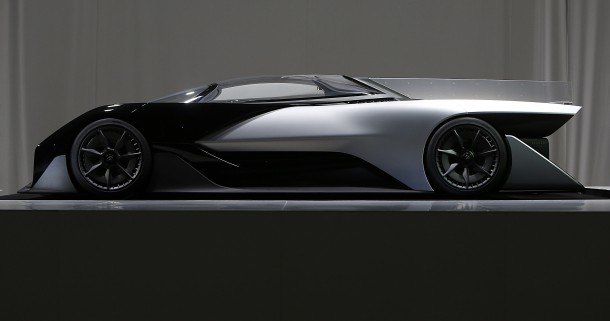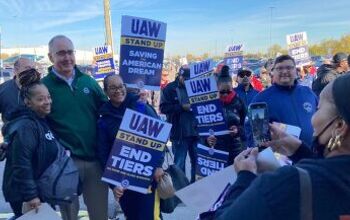News Round-up: Faraday 'Storyteller' Jumps to Kia, The War in the Air(waves), and 'Brexit' Vote Tomorrow

A company that still has yet to build its “game-changing” car will need to find another “storyteller.”
That, the UK will finally have an answer to The Clash, and Cadillac has a dogfight with Silicon Valley … after the break.
Faraday Future “storyteller” jumps EV ship, lands in Koreatown
Former Kelley Blue Book and General Motors communication hotshoe James Bell has left supposed electric-vehicle manufacturer Faraday Future after just four months at the Chinese-funded Silicon Valley upstart, where he worked as a contractor. Starting today, Bell is the newly minted Director of Corporate Communications for Kia Motors America.
According to Bell, he’s “lucky for both opportunities” as both have “fascinating brands and product plans” and the move was a “very difficult decision.” But a four-month stint anywhere is pretty short.
As for Faraday Future, it continues to produce more headlines than cars. Keep an eye on this space.
‘Brexit’ vote to commence tomorrow
A referendum that will decide whether Britain stays in or leaves the European Union will commence tomorrow. Polls close at 10 p.m. GMT and first counts are expected just after midnight.
A number of automakers produce vehicles in the UK, including Honda, Nissan/Infiniti, Jaguar/Land Rover, and others. Future trade pacts for those automakers are at stake as they’ve been negotiated between the European Union and other countries.
Expect a final tally and national declaration the morning of Friday, June 24th.
Volkswagen shareholders are pissed, but powerless
Shareholders of Germany’s largest automaker voiced their concerns on Volkswagen’s emissions scandal, executive bonuses, and the company’s financial losses today at Volkswagen Group’s annual shareholder meeting in Hanover, Germany.
Unfortunately, their concerns will likely fall on deaf ears, as just 11 percent of the company’s stock is held by shareholders outside of the Porsche clan, state of Lower Saxony, and the sovereign wealth fund of Qatar.
From the New York Times:
“They have been rewarded for failure,” said Hans-Christoph Hirt, co-head of Hermes EOS, a firm that represents large institutional investors. Addressing the meeting, Mr. Hirt urged shareholders not to re-elect the supervisory board, saying its members were ultimately responsible for a “culture in which the emissions scandal was able to unfold and remain undetected for many years.”
But with outsize influence in the hands of a few large shareholders, top management at the company faced little threat to its authority.
…
In a sign of dissenters’ lack of clout, a motion to remove Mr. Pötsch as chairman of the annual meeting was rejected by shareholders holding 98.8 percent of the voting shares present. Manfred Klein, a shareholder who argued in favor of the motion, said that Mr. Pötsch had a conflict of interest because he was the chief financial officer during the period when the emissions deceit took place.
Automakers and wireless companies still at odds over spectrum
Automakers, who were granted unfettered and uninterrupted access to wireless spectrum in 1999, are now on the defence as wireless companies look to share the same finite space, reports Automotive News.
Like many things, radio spectrum is finite. As wireless services grow, and are expected to grow six-fold by 2020, wireless carriers and other technology companies want in on automaker spectrum.
As you can expect, automakers are not too pleased.
From Automotive News:
“We’re putting hardware into vehicles based on the current channel configuration,” Lightsey said in an interview. “All of that hardware would have to be changed. That’s obviously a concern.”
Though it might be a case of automakers being greedy.
But critics contend Detroit also wants to provide services already available on smartphones — including entertainment, traffic warnings and mapping.
“The auto industry has been very successful in pitching this as being about our great concern for life and safety, while these guys just want you to stream cat videos and Netflix while you’re in your car,” Harold Feld, senior vice president at the policy group Public Knowledge, said in an interview.
Trust me, Feld. Cadillac CUE is way more distracting than a cat video.
Income inequality, consumer credit defaults could mean not good very bad things later
Instead of pretending to know what I’m talking about when it comes to financial markets and products (for the record, I don’t know anything about financial markets/products), I’ll let Business Insider sum up this bit:
The US consumer is having a tough time of it.
That’s the message from Matthew Mish and Stephen Caprio at UBS, who put out a research report on Tuesday about why US consumer defaults are rising.
The note is full of interesting stats, but the short version of it is that US consumers are struggling to pay their debts, and that is going to have a bigger effect on the bond market than people realize.
“Rising consumer delinquencies are another structural headwind that we believe should place a floor on credit spread tightening and a cap on government bond yields rising,” the note said.
The note also hits on a really interesting big-picture point: The rise of inequality post-financial-crisis is fueling a credit boom that could do damage further down the road.
The argument here is that as the pool of wealth becomes more concentrated, the greater the asymmetry between the haves, who typically want to invest and get a return on their money, and the have nots, who are typically borrowers.
That pushes down the creditworthiness of the average borrower. Add in a low-interest-rate environment, where investors are searching for yield, and you have a problem.
[Image: Bizuayehu Tesfaye/AP for Faraday Future]

More by Mark Stevenson
Latest Car Reviews
Read moreLatest Product Reviews
Read moreRecent Comments
- Lou_BC Blows me away that the cars pictured are just 2 door vehicles. How much space do you need to fully open them?
- Daniel J Isn't this sort of a bait and switch? I mean, many of these auto plants went to the south due to the lack of unions. I'd also be curious as how, at least in my own state, unions would work since the state is a right to work state, meaning employees can still work without being apart of the union.
- EBFlex No they shouldn’t. It would be signing their death warrant. The UAW is steadfast in moving as much production out of this country as possible
- Groza George The South is one of the few places in the U.S. where we still build cars. Unionizing Southern factories will speed up the move to Mexico.
- FreedMike I'd say that question is up to the southern auto workers. If I were in their shoes, I probably wouldn't if the wages/benefits were at at some kind of parity with unionized shops. But let's be clear here: the only thing keeping those wages/benefits at par IS the threat of unionization.


































Comments
Join the conversation
KIA is developing the new car Batman
Anyone see that KIA is #1 on the Power initial quality list just out? Last year's #1, Porsche, is #2; KIA was #2 last year.